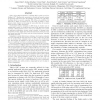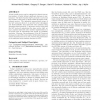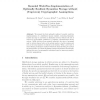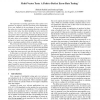264 search results - page 26 / 53 » Bounding the number of tolerable faults in majority-based sy... |
166
Voted
ICDCS
2012
IEEE
13 years 4 months ago
2012
IEEE
Today’s largest High Performance Computing (HPC) systems exceed one Petaflops (1015 floating point operations per second) and exascale systems are projected within seven years...
137
click to vote
SOSP
2005
ACM
15 years 10 months ago
2005
ACM
A fault-scalable service can be configured to tolerate increasing numbers of faults without significant decreases in performance. The Query/Update (Q/U) protocol is a new tool t...
106
click to vote
WDAG
2007
Springer
15 years 8 months ago
2007
Springer
We present the first optimally resilient, bounded, wait-free implementation of a distributed atomic register, tolerating Byzantine readers and (up to one-third of) Byzantine serve...
107
click to vote
DATE
2008
IEEE
15 years 8 months ago
2008
IEEE
The importance of testing approaches that exploit error tolerance to improve yield has previously been established. Error rate, defined as the percentage of vectors for which the...
104
click to vote
PVM
2010
Springer
15 years 8 days ago
2010
Springer
Abstract. With the number of computing elements spiraling to hundred of thousands in modern HPC systems, failures are common events. Few applications are nevertheless fault toleran...




